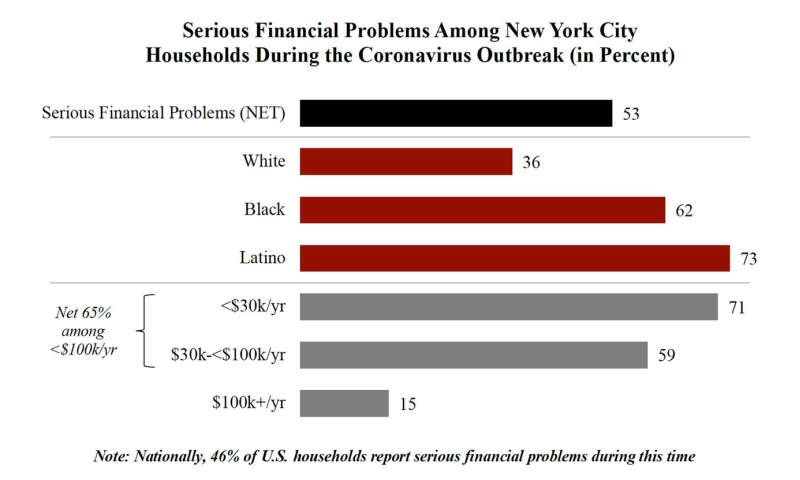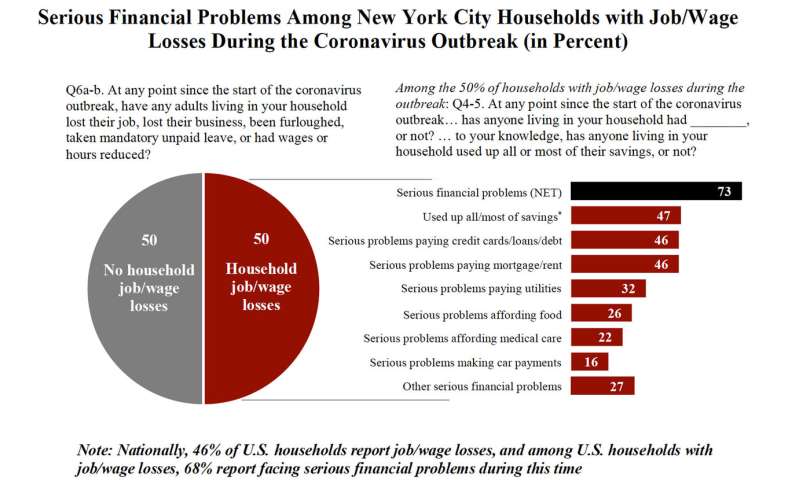Households in 4 major cities report 'serious financial problems'
by Science X staff
At least half of households in the four largest U.S. cities—New York , Los Angeles, Chicago, and Houston—report facing serious financial problems during the coronavirus outbreak. Their worries include depleting household savings, paying credit card bills and other debts, and affording medical care, according to a new NPR/Robert Wood Johnson Foundation/Harvard T.H. Chan School of Public Health poll.
In New York, 53 percent of respondents said they are facing serious fiscal hardships, with 56 percent in Los Angeles, 53 in Chicago, and 63 in Houston.
The poll found that many of the cited problems are concentrated among Black and Latino households, those with annual incomes below $100,000, and households experiencing job or wage losses since the start of the outbreak. Serious financial problems during the coronavirus outbreak are reported by majorities of Black households in New York (62 percent), Los Angeles (52 percent), Chicago (69 percent) and Houston (81 percent). Serious financial problems are also reported by majorities of Latino households in New York City (73 percent), Los Angeles (71 percent), Chicago (63 percent), and Houston (77 percent) during this time. In addition, majorities of households with annual incomes below $100,000 report facing serious financial problems in New York City (65 percent), Los Angeles (64 percent), Chicago (59 percent), and Houston (72 percent) during the coronavirus outbreak.
When it comes to employment problems, half or more households in these cities report any adult household members have lost their jobs, been furloughed, or had wages or hours reduced since the start of the outbreak (New York—50 percent, Los Angeles—61 percent, Chicago—51 percent, Houston—57 percent). And among these households with job or wage losses during the coronavirus outbreak, more than two-thirds report facing serious financial problems (New York—73 percent, Los Angeles—73 percent, Chicago—69 percent, Houston—81 percent).

This poll, "The Impact of Coronavirus on Households in Major U.S. Cities," was conducted July 1-Aug. 3 among 3,454 U.S. adults, including 512 adults living in New York City, 507 adults living in Los Angeles, 529 adults living in Chicago, and 447 adults living in Houston. Adults in this survey were asked to report on serious problems facing both themselves and others living in their households, so measures are reported as a percentage of households for all household-related questions.
In health care, significant shares of households in the four cities report household members have been unable to get medical care for serious problems when they needed it during the coronavirus outbreak, and they have faced negative health consequences as a result. Since the start of the coronavirus outbreak, 19 percent of New York households, 20 percent of Los Angeles households, 23 percent of Chicago households, and 27 percent of Houston households report anyone in their household has been unable to get medical care for a serious problem when they needed it. A majority of these households with anyone who has been unable to get care when needed (New York City—59 percent, Los Angeles—63 percent, Chicago—55 percent, Houston—75 percent) report negative health consequences as a result.
"Before federal coronavirus support programs even expired, we find millions of people with very serious problems with their finances, health care, and with caring for children," said Robert J. Blendon, co-director of the survey and Richard L. Menschel Professor of Public Health and Professor of Health Policy and Political Analysis Emeritus at Harvard T.H. Chan School of Public Health. "Though we want to believe we are all in this together, findings show problems concentrated in people who earn less than $100,000, people who have lost wages or jobs, and Black and Latino Americans."
When it comes to caring for children, majorities of households with children in New York (60 percent), Los Angeles (69 percent), Chicago (51 percent), and Houston (60 percent) report experiencing serious problems during this time. This includes sizable shares of households with serious problems keeping children's education going, helping children adjust to major life changes, finding child care while working, and finding space for children to get physical activity while maintaining a safe distance from others.
Households with children in major cities also face significant barriers with internet connectivity during the coronavirus outbreak. At least four in 10 households with children report either having serious problems with their internet connection to do schoolwork or their jobs, or that they do not have a high-speed internet connection at home (New York—43 percent, Los Angeles—54 percent, Chicago—40 percent, Houston—45 percent.
More information: The Impact of Coronavirus on Households in Major U.S. Cities: media.npr.org/assets/img/2020/ … ort-090920-final.pdf
Provided by Harvard University